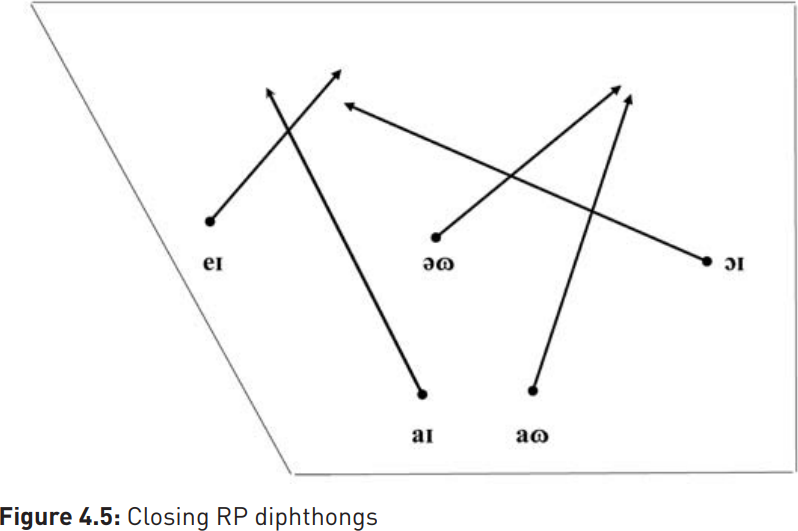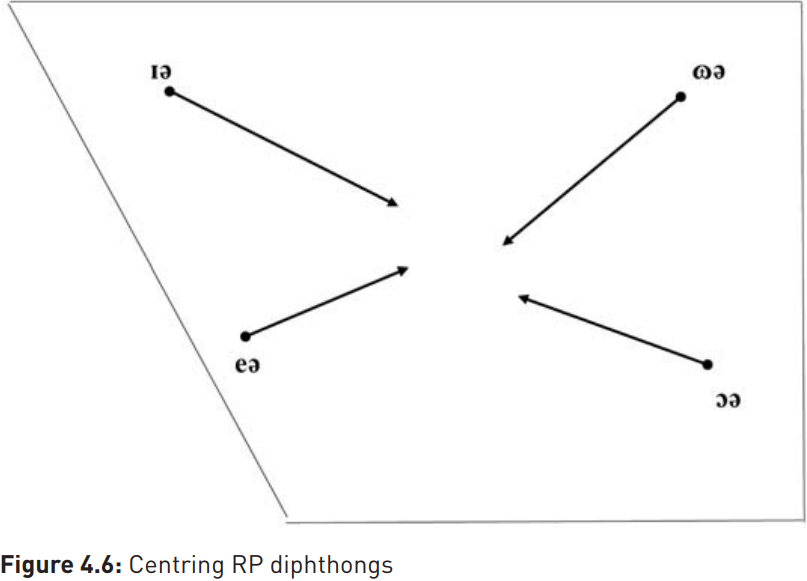


 Grammar
Grammar
 Tenses
Tenses
 Present
Present
 Past
Past
 Future
Future
 Parts Of Speech
Parts Of Speech
 Nouns
Nouns
 Verbs
Verbs
 Adverbs
Adverbs
 Adjectives
Adjectives
 Pronouns
Pronouns
 Pre Position
Pre Position
 Preposition by function
Preposition by function 
 Preposition by construction
Preposition by construction
 Conjunctions
Conjunctions
 Interjections
Interjections
 Grammar Rules
Grammar Rules
 Linguistics
Linguistics
 Semantics
Semantics
 Pragmatics
Pragmatics
 Reading Comprehension
Reading Comprehension|
Read More
Date: 2023-09-26
Date: 12-1-2022
Date: 2023-06-21
|
Diphthongs
The presence of a number of diphthongs, which show a change in vowel quality as the tongue travels between two points, is another reason why English does not fit the cardinal vowel schema particularly well.
Think about the vowel in right (and ignore the fact that the spelling still retains a gh sequence that is no longer pronounced). Try saying it slowly a number of times, and you’ll feel your tongue travel quite a distance. In RP the vowel begins somewhere near [a] but moves to the position of the kick vowel [I], and it is this trajectory that gives the sound its distinctive quality. The right vowel is therefore transcribed [aI], the convention for diphthongs being to transcribe their beginning and end points. The trajectory for the RP vowel in house is even wider, starting from a similar point but ending near the push vowel  . The starting point for the blow vowel in RP is different: for most speakers the tongue starts in schwa position and moves to the
. The starting point for the blow vowel in RP is different: for most speakers the tongue starts in schwa position and moves to the  position of the push vowel again. Two further vowels, those of boy
position of the push vowel again. Two further vowels, those of boy  and bay [eI], make up the set of closing diphthongs in English, all of which have a close vowel as their end point, as can be seen in the figure below.
and bay [eI], make up the set of closing diphthongs in English, all of which have a close vowel as their end point, as can be seen in the figure below.

Another set of diphthongs, all of which end in schwa  , are known as centring diphthongs. These are the vowels in RP beer
, are known as centring diphthongs. These are the vowels in RP beer  and square
and square  . Some RP speakers also have a centring diphthong in poor
. Some RP speakers also have a centring diphthong in poor  and in pore
and in pore  , while others do not, pronouncing both words identically to paw.
, while others do not, pronouncing both words identically to paw.

Note also that where a centring diphthong occurs, an r generally is present in the spelling, which in RP and many other varieties of English has been replaced by schwa. In what are known as rhotic areas (for example, North America and the west of England), this r has never been lost, and there is consequently no diphthong.
|
|
|
|
لصحة القلب والأمعاء.. 8 أطعمة لا غنى عنها
|
|
|
|
|
|
|
حل سحري لخلايا البيروفسكايت الشمسية.. يرفع كفاءتها إلى 26%
|
|
|
|
|
|
|
العتبة العباسية تبحث سبل التعاون مع شركة التأمين الوطنية
|
|
|